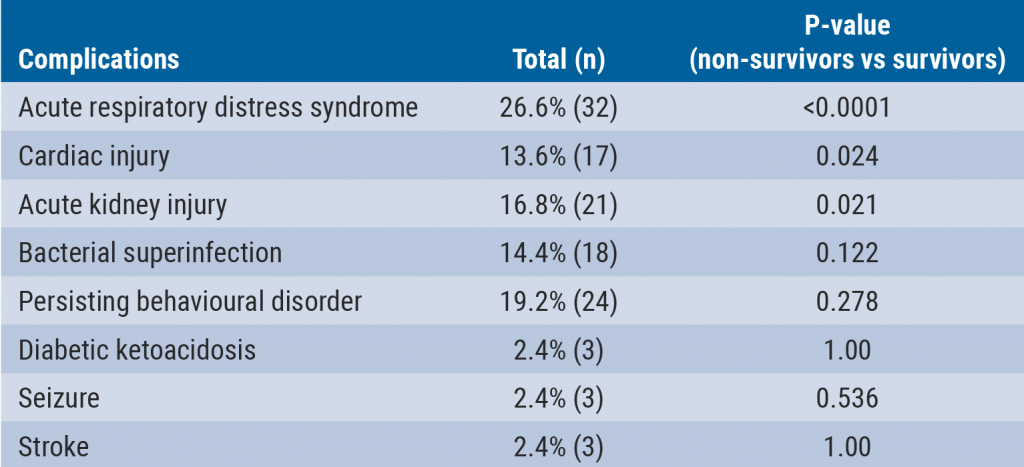The incidence of chronic subdural haematoma is rising due to the ageing population and the increasing use of oral anticoagulant therapy. Surgery by burr hole craniotomy with closed subdural drainage is still the mainstay of therapy, but dexamethasone is widely applied as an alternative or adjuvant treatment.
The DECSA trial (EUCTR 2015-001563-39) tested the hypothesis that dexamethasone is non-inferior to surgical treatment in achieving favourable functional outcome [1]. DECSA was a randomised, multicentre, phase 4 trial with blinded endpoint assessment. Patients with chronic subdural haematoma were allocated to dexamethasone 16 mg daily for 4 days, then tapered to 50% every 3 days over 19 days; or surgery by burr hole craniotomy with closed subdural drainage within 24–48 hours. Primary endpoints were favourable functional outcome at 3 months (modified Rankin Scale score 0–2) and, in a separate study, cost-effectiveness at 12 months. Results were presented by Dr Ishita Miah (Leiden University Medical Center, the Netherlands).
An interim-analysis including 252 participants revealed between-group differences in efficacy and safety, after which immediate termination of the trial was recommended. Favourable functional outcome was seen in 79 of 124 patients (63.7%) in the dexamethasone group versus in 97 of 124 patients (78.2%) in the surgery group (adjusted OR 0.70; 95% CI 0.33–2.95). No symptoms were observed in 21 of 124 patients (16.9%) versus 44 of 124 patients (35.5%), respectively. Eight (6.5%) versus 2 patients (1.6%) died (adjusted OR 2.74; 95% CI 0.45–16.65). The number of patients with serious adverse events was 61 (65.6%) versus 32 (34.4%), respectively. In the dexamethasone group, 67 of 127 (52.8%) needed additional surgery.
- Miah IP, et al. Dexamethasone versus Surgical Treatment for Chronic Subdural Hematoma: The DECSA trial. OPR-202, EAN 2021 Virtual Congress, 19–22 June.
Copyright ©2021 Medicom Medical Publishers
Posted on
Previous Article
« Neurological symptoms and complications of COVID-19 affect outcomes Next Article
‘Mozart effect’ in epilepsy: why Mozart tops Haydn »
« Neurological symptoms and complications of COVID-19 affect outcomes Next Article
‘Mozart effect’ in epilepsy: why Mozart tops Haydn »
Table of Contents: EAN 2021
Featured articles
Letter from the Editor
COVID-19
First evidence of brainstem involvement in COVID-19
Cognitive/behavioural alterations persistent after COVID-19
Neural base of persistent hyposmia after COVID-19
Neurological symptoms and complications of COVID-19 affect outcomes
Cerebrovascular Disease
Intracerebral haemorrhage only slightly increases mortality in COVID-19 patients
Stroke with covert brain infarction indicates high vascular risk
Expanding precision medicine to stroke care
Dexamethasone not indicated for chronic subdural haematoma
Cognitive Impairment and Dementia
Severe outcomes of COVID-19 in patients with dementia
Promising diagnostic accuracy of plasma GFAP
Sex modulates effect of cognitive reserve on subjective cognitive decline
Hypersensitivity to uncertainty in subjective cognitive decline
Epilepsy
Minimally invasive device to detect focal seizure activity
‘Mozart effect’ in epilepsy: why Mozart tops Haydn
Migraine and Headache
Factors associated with decreased migraine attack risk
Pregnant migraine patients at higher risk of complications
Occipital nerve stimulation in drug-resistant cluster headache
Rhythmicity in primary headache disorders
Multiple Sclerosis and NMOSD
Typing behaviour to remotely monitor clinical MS status
Alemtuzumab in treatment-naïve patients with aggressive MS
No higher early MS relapse frequency after stopping ponesimod
Good long-term safety and efficacy of inebilizumab in NMOSD
Neuromuscular Disorders
Inability to recognise disgust as first cognitive symptom of ALS
Pathogenic T-cell signature identified in myasthenia gravis
Parkinson’s Disease
Levodopa-carbidopa intestinal gel in patients with advanced PD
New Frontier – Navigated Transcranial Ultrasound
Exploring the possibilities
Related Articles

August 18, 2021
Severe outcomes of COVID-19 in patients with dementia

August 17, 2021
Letter from the Editor
August 18, 2021
Machine-learning method accurately classifies patients with MS
© 2024 Medicom Medical Publishers. All rights reserved. Terms and Conditions | Privacy Policy
HEAD OFFICE
Laarderhoogtweg 25
1101 EB Amsterdam
The Netherlands
T: +31 85 4012 560
E: publishers@medicom-publishers.com

